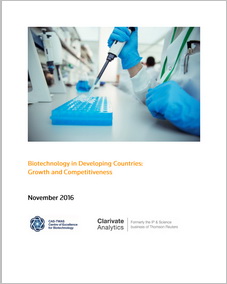
Report Says Developing World Achieves Significant Growth in Biotechnology
November 23, 2016| |
 A new report released by Beijing-based CAS-TWAS Centre of Excellence for Biotechnology says that the developing world is achieving significant growth in a broad cross-section of biotechnology fields, many of them directly tied to food production, health, and other dimensions of human well-being.
A new report released by Beijing-based CAS-TWAS Centre of Excellence for Biotechnology says that the developing world is achieving significant growth in a broad cross-section of biotechnology fields, many of them directly tied to food production, health, and other dimensions of human well-being.
Biotechnology in Developing Countries: Growth and Competitiveness is the first extensive document summarizing the development status of a specific technology area in the developing world, according to Bai Chunli, president of both CAS and TWAS. He added that "it provides a strong, valuable assessment of biotechnology activities in developing countries, as measured in scientific publications and patents."
The report is a broad survey of research and development work from 2005 to 2014. Its major findings include:
- Biotechnology research grew steadily, with a 117% increase in published studies. However, biotechnology research from the developing world is less cited in other research papers – only about 83% as much.
- Over 85% of the biotech papers that were co-authored by science-and-technology lagging countries resulted from international collaborations. Countries in sub-Saharan Africa in particular benefited from international collaboration, resulting in a notably high impact.
- Patent filings in the developing world have been most active in industry, food and environmental biotechnology sectors. Most of those patents have been new enzymes, totalling 79,694 – comprising of more than 40% of the overall patents.
- China leads in biotechnology papers produced in the ten-year period with 78,263, followed by India with 24,081 and Brazil with 17,769. It also leads all countries with 149,339 patent families, followed by India with 15,420 and Mexico with 14,574.
To read the full report, visit the TWAS website.
| |
Biotech Updates is a weekly newsletter of ISAAA, a not-for-profit organization. It is distributed for free to over 22,000 subscribers worldwide to inform them about the key developments in biosciences, especially in biotechnology. Your support will help us in our mission to feed the world with knowledge. You can help by donating as little as $10.
-
See more articles:
-
News from Around the World
- Report Says Developing World Achieves Significant Growth in Biotechnology
- ICAR-CIRCOT Hosts High Level African Delegation Biotech Study Tour in India
- African Delegation Visits Indian Bt Cotton Farmers
- Scientists Shut off Plant's Sunshield to Boost Productivity
- U.S. Court Rejects GMO Ban in Hawaii County
- NZ Scientists Develop GE Ryegrass for Healthier Animals
- PH Highlights Role of Biotech in National Development
- Genome Sequence of 5,310-Year-Old Maize Cob Provides Insights on Its Early Domestication
-
Research Highlights
- OsACOS12 is Vital in Pollen Exine Formation and Anther Development in Rice
- Overexpression of RAG2 Improves Grain Yield and Quality of Rice
-
Beyond Crop Biotech
- Chinese Scientists Test CRISPR Gene-editing in Human for the First Time
- DBT Prepares India for "Brucella-Free Villages"
-
From the BICs
- Filipino Senior High School Students Undertake Agri-biotech Boot Camp
-
Plant
- Inactivation of Symbiotic Nitrogen Fixation Related Genes in Lotus Using CRISPR-Cas9
- Researchers Engineer Potyvirus Resistance in Arabidopsis Using CRISPR/Cas9
-
Read the latest: - Biotech Updates (February 18, 2026)
- Gene Editing Supplement (January 28, 2026)
- Gene Drive Supplement (February 22, 2023)
-
Subscribe to BU: - Share
- Tweet
